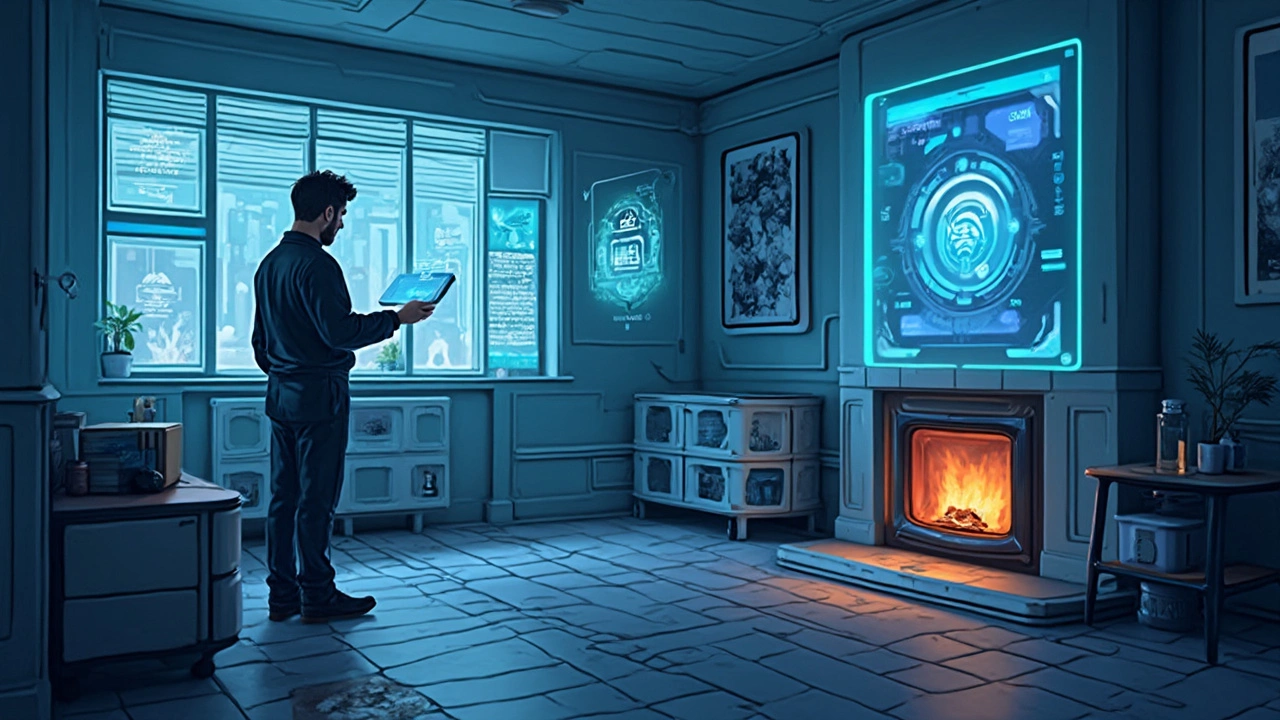So, your boiler just decided to stop working, and now you're left scratching your head, right? Before you start thinking about living like you're on a polar expedition, take a breather. Yeah, it might feel like a disaster, especially if you're knee-deep in winter, but often, the solution is just a call away. Knowing who to ring can save your day and get the warmth flowing again.
First things first, identifying the problem is key. Sometimes it's obvious – it isn't heating up or making odd noises. Other times, it's a bit more subtle. Maybe the water isn't quite as hot as it used to be? Before speed-dialing the pros, there are some checks you can handle.
Check your boiler’s pressure gauge. If it's too low, it might just need a little top-up. How about the thermostat? If it's gone rogue, it might just need a reset – kind of like that one gadget that acts spooky until you restart it. These small checks can sometimes do the trick without a whisker of hassle.
- Recognize the Problem
- DIY Checks Before Calling
- When to Call a Professional
- Choosing the Right Technician
- Preventive Maintenance Tips
Recognize the Problem
When your boiler isn't working, pinpointing the issue can be your first step to finding a solution. The problem could range from something simple to a more complex issue requiring professional help. Putting on your detective hat, you can start by looking for common signs and symptoms your boiler might be showing.
Common Signs Your Boiler Needs Attention
- No heat or hot water: Could be due to various reasons, including malfunctioning thermostats or low water levels. Also, make sure that the power source is working properly.
- Leaks: Even small drips can signal significant internal pressure problems.
- Strange noises: Banging, whistling, or gurgling sounds might mean air in the system or a failing pump.
- Frequent on-and-off cycling: This could be from issues with water pressure or a thermostat fault.
You don't need to be a certified technician to catch these signals but being aware can make all the difference. Remember, as the saying goes, "knowledge is power." A familiar face in the industry adds,
"A few minutes spent in inspecting and identifying boiler issues can save you time and money in the long run," says Jack Thompson, a senior technician at Reliable Heating Solutions.
Diagnostic Tools You Can Use
If you're feeling adventurous and want to play boiler detective for a bit, grab a flashlight and check a few things:
- Inspect the pressure gauge: Most boilers should maintain a pressure of 1 to 1.5 bars. If it's too low or too high, there's your hint.
- Check the pilot light: If it’s out, relighting can sometimes solve the issue. If it doesn't stay lit, that’s a problem worth noting.
- Listen for odd sounds: A gentle hum is normal, but anything else could spell trouble.
Armed with this info, you could either fix the small hiccups or be in a stronger position when you call for a boiler repair expert, knowing what you’re talking about. If all this doesn't help, it might be time to call in the pros.
DIY Checks Before Calling
Before you panic and call up a boiler technician, there are a few things you can do on your own. These quick checks might save you time and money.
Check the Thermostat
Believe it or not, sometimes the easiest solutions are overlooked. Make sure your thermostat is set to the right temperature. It sounds silly, but it might have been accidentally knocked off its usual setting. If it's digital, make sure the batteries haven't died.
Inspect the Fuse Box
If your broken boiler isn't showing any signs of life, head over to your fuse box. A tripped switch can cut power to the unit completely. Flip it back on if it's down, and see if this brings your boiler humming back to life.
Pressure Gauge
If your boiler is acting up, the pressure gauge can tell you a lot. Ideally, it should be between 1 and 2 bars. If it's lower, you'll need to add water to the system. This can be done by turning a small valve on the side of the boiler – just be careful not to overdo it!
Check for Error Codes
Many modern boilers come equipped with digital displays that show error codes when things go awry. Grab your boiler manual and match up the code with the manual’s guide. It can point you in the right direction or at least offer a hint as to what's gone wrong.
Bleed Your Radiators
If your heating is uneven or radiators are colder at the top, bleeding them might help. Use a radiator key to let out trapped air until water starts to trickle out smoothly.
Table of Common Boiler Issues
Check out this quick guide on common issues and their possible causes:
| Issue | Possible Cause |
|---|---|
| No heating or hot water | Thermostat is turned off or set incorrectly |
| Strange noises | Air in the system or low pressure |
| Boiler won't ignite | Gas supply problem or faulty ignition |
If these checks don't get your boiler back on track, it might be time to call in a professional. But hey, at least you've ruled out a few possibilities, and maybe even learned a thing or two in the process!

When to Call a Professional
So, you've tried all the basics, and your boiler is still throwing a fit. Yep, it’s time to bring in the big guns. Calling a boiler technician isn't always the first option, but sometimes it’s the only option you have to avoid turning a manageable problem into a costly nightmare.
Why You Need an Expert
Boilers are not just giant tea kettles—they're complex systems with heaps of parts that can go wrong. Now, unless you’re trained, tinkering with the insides might be more trouble than it's worth. A broken boiler might have issues like leaks or gas troubles, and honestly, these aren’t DIY territory.Also, if you hear weird banging noises or can smell something funky (like gas), then it's definitely time to call in the pros. Gas problems can be dangerous, and at that point, a boiler repair service may be crucial not just for the boiler, but for your safety.
When It's an Emergency
It's generally a good rule of thumb to call professional help when:- You’ve got a total shutdown, and the basic fixes don't work.
- There’s a visible leak or water pooling around the boiler.
- Ignition problems persist. No one likes their boiler going on and off like a disco light.
- Your energy bills spike for no clear reason. This suggests the system is overworking.
Choosing the Right Technician
Don’t just grab the first name you find online. Make sure they have the proper certifications for emergency boiler service. A good tip is to find an engineer who’s certified by Gas Safe in the UK or an equivalent in other countries. It might also help to check reviews or seek recommendations from trusted sources.Remember, handling a boiler improperly can lead to more expensive repairs down the line. In worst-case scenarios, it can be flat out dangerous. Don’t risk it. Call in the boiler repair professionals, and get the peace of mind you deserve.
Choosing the Right Technician
So, you've decided it's time to call in the experts. But with so many options out there, how do you choose the right one? Finding the right boiler technician can mean the difference between a quick fix and a drawn-out saga.
Qualifications Matter
Make sure the person you're hiring is certified. In the UK, for instance, boiler technicians should be Gas Safe registered. This means they've met all the necessary regulations and safety standards. It's kind of like having a badge of trust.
Experience Counts
While every technician has to start somewhere, you generally want someone who knows their way around boilers like the back of their hand. Ask them about their past jobs or check their online reviews to get a sense of their track record.
Look for Recommendations
Your friends or neighbors might have faced similar issues. Ask them whom they called. A recommendation from someone you trust can save you a lot of guesswork.
Understand Their Pricing
Nobody likes surprises, especially when it comes to bills. Ask for a detailed quote before they start any work. Some people might charge hourly, while others might offer a fixed rate. Know what you're getting into.
Emergency Service Availability
Let’s be real, boilers don't usually pick a convenient time to break down. Check if the technician offers emergency boiler service. It’s good to know if they'll be there in a pinch.
Here's a quick snapshot to help choose:
| Feature | Importance |
|---|---|
| Certification | High |
| Experience | Medium to High |
| Recommendations | High |
| Pricing Transparency | High |
| Emergency Service | Medium |
Choosing the right technician might take a bit of time, but it'll be worth it when your broken boiler is back to keeping your home cozy.

Preventive Maintenance Tips
If you've ever faced the cold shoulder from your boiler, you know why keeping it in good shape is key. Regular boiler repair checks can keep potential problems from turning into full-blown meltdowns. Let’s dive into some simple steps to let your boiler live its best life.
Yearly Professional Check-ups
Think of this like a doctor's visit, but for your boiler. Once a year, get a professional to take a look. They'll inspect and clean the inside, making sure everything is tickety-boo. They'll catch signs of trouble before they're big enough to cause issues.
Regular Pressure Checks
Keep an eye on that pressure gauge. Most boilers like to hang out around 1-1.5 bars when they're cool. If it dips too low or jumps too high, give it a tweak or top it up. Just like checking your car tire pressure to keep it safe on the road.
Bleed the Radiators
When the heat isn't spreading evenly, it might be radiator air that’s causing the fuss. Every so often, bleed your radiators. Use a wrench or a radiator key, and open the valve until you hear that satisfying hiss. Once water dribbles out, you’re golden. This keeps your system efficient and rooms cozy.
Inspect for Leaks
Every few weeks, especially in cold weather, check around the boiler and the piping for leaks. No one likes a wet surprise, and catching leaks early can save a world of pain—protecting your home and saving cash, too.
Keep Vents Clear
Boilers need to breathe. Check that air vents, flues, and any outside openings are clear of dust, debris, or stray garden life. Proper airflow not only keeps it running well but also ensures safety.
A little care can keep you warm and worry-free through winter. By sticking to these simple maintenance tips, those chilly months can pass without a hitch, and that’s one less headache to manage.

I am an expert in the services industry with a focus on appliance repair. My passion lies in understanding how things work and educating others in simple, engaging ways. This enthusiasm fuels my writing, where I delve into topics around appliance maintenance and troubleshooting. I aim to make these subjects clear and accessible to all readers.